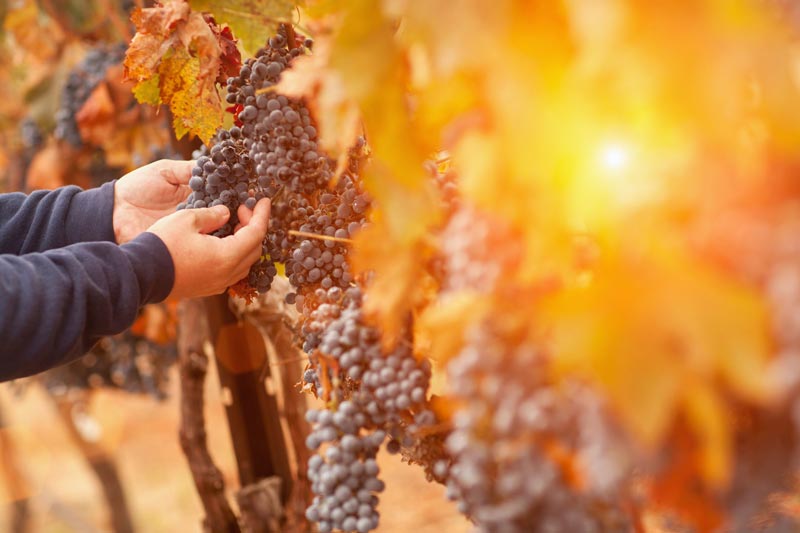Zakynthos has a long history of participating in the grape harvest, which is called
Zakynthos Guide
Our Guide
Harvesting grapes in September is more than simply the first step in creating wine on Zakynthos
26/09/2024
Harvest time provides an exceptional chance for tourists to see this age-old custom in action

With the arrival of September, the island of Zakynthos (Zante) becomes a center of activity. Grape harvest season peaks this month, when local farmers are busy gathering their hard-earned crop and preparing it to be turned into delicious wine. The winemaking culture has deep roots in Zakynthos' history, and the harvest in September is a time of great joy and significance, filled with shared history and custom.
Zakynthos: An Ideal Vineyard Location
The island of Zakynthos in the Ionian Sea is well-known as a grape-growing paradise due to its rich soil and pleasant weather. A diverse array of grape types thrive in the island's Mediterranean climate, which features scorching summers and moderate winters. The volcanic soil of the island lends itself to high-quality grapes, which in turn impart characteristics that are characteristic of the island's wines.
The inhabitants of Zakynthos have been making wine for a very long time, and they have done so by passing their skills and expertise down through many generations. The cultivation of grapes and the manufacturing of wine are traditions that have persisted throughout the island's history and are thus deeply ingrained in its culture. The commitment of the island's farmers and winemakers has resulted in a thriving wine industry on Zakynthos, which includes both huge estates and smaller, family-run vineyards.
A Devoted Effort: The Grape Harvest
Zakynthos has a long history of participating in the grape harvest, which is called "trigos" in Greek. One of the most time-consuming and satisfying parts of making wine is harvesting, which starts in early September and continues until around the middle of October. After a long, hard year of nurturing, the vineyards finally bear fruit. To guarantee the best quality selection and maintain the fruit's purity, local families and workers, often with the assistance of friends and neighbors, harvest the grapes by hand.
The timely completion of the harvest depends on the collective efforts of entire communities. It is best to pick grapes in the early morning to escape the heat of the middle of the day, and careful handling is usually required to avoid injuring the fruit. The following leg of the voyage starts with the collection of baskets of grapes and their transportation to the wineries.
Even though it's a lot of effort, the grape harvest is always a joyous occasion. It's a time to gather with loved ones, tell tales, and continue customs passed down through generations. As a community comes together to enjoy the bounty of the land, they frequently sing traditional songs, conduct traditional dances, and feast on traditional foods.
Zakynthos Grapes: Specialty Grapes for Extraordinary Wines
The distinctive wines of Zakynthos are crafted from a number of grape varietals indigenous to the island. An iconic white wine made from the locally cultivated Verdea grape variety is one of the region's most well-known exports. The island's long-standing tradition of producing verdea wine—a strong, acidic white wine—is named after the Italian term for green ("verde"). The wine is well-liked by both residents and tourists due to its distinctive dryness and freshness.
Zakynthos is famed for its Verdea wine, but it also makes several other red and white wines, mostly from indigenous grapes like Skiadopoulo, Avgoustiatis, and Pavlos, which are less well-known. The robust aromas and flavors of these grapes make them highly sought-after for making wines that have a true connection to the island's soil.
How Wine Is Made: A Journey from Grapevine to Bottle
The winemaking process starts once the grapes have been picked. Even though contemporary technology has been utilized to enhance the quality of manufacturing in Zakynthos, traditional methods are still extensively used. Depending on the kind of wine being created, the grapes are either crushed and pressed to extract juice, which is subsequently fermented in oak barrels or stainless steel vats.
The natural activity of yeast in the grape juice turns it into wine throughout the fermentation process, which can last for many weeks. To bring forth more nuance and taste in some grape varietals, winemakers opt to let them mature in oak barrels. A wine that is uniquely Zakynthos, shaped by its weather, soil, and long-established traditions, is the final product.
Honoring the Heritage and Traditions of the Region
In Zakynthos, the grape harvest is a time to honor the island's long history of farming, the strength of its people, and the inseparable bond between humanity and the earth. Zakynthos is no exception to the rule when it comes to the importance of wine in Greek culture. People on the island take great delight in sharing wine from their vineyards at all kinds of events, from family reunions to community festivals, and it always seems to bring them closer together.
Harvest time provides an exceptional chance for tourists to see this age-old custom in action. Tourists may get a real feel for Zakynthos' winemaking history at one of the several vineyards that welcome visitors with tours and tastings. Each glass, whether it's a powerful red or the island's renowned Verdea wine, reveals a tale of tradition, labor, and the gorgeous island's rich history.
Harvesting grapes in September is more than simply the first step in creating wine on Zakynthos. it's a joyous occasion honoring the island's natural beauty, vibrant culture, and eternal soul.


